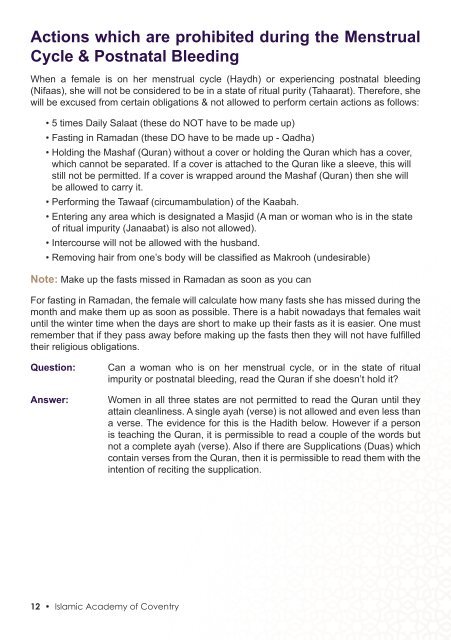Create successful ePaper yourself
Turn your PDF publications into a flip-book with our unique Google optimized e-Paper software.
Actions which are prohibited during the Menstrual<br />
Cycle & Postnatal Bleeding<br />
When a female is on her menstrual cycle (Haydh) or experiencing postnatal bleeding<br />
(Nifaas), she will not be considered to be in a state of ritual purity (Tahaarat). Therefore, she<br />
will be excused from certain obligations & not allowed to perform certain actions as follows:<br />
• 5 times Daily Salaat (these do NOT have to be made up)<br />
• Fasting in Ramadan (these DO have to be made up - Qadha)<br />
• Holding the Mashaf (Quran) without a cover or holding the Quran which has a cover,<br />
which cannot be separated. If a cover is attached to the Quran like a sleeve, this will<br />
still not be permitted. If a cover is wrapped around the Mashaf (Quran) then she will<br />
be allowed to carry it.<br />
• Performing the Tawaaf (circumambulation) of the Kaabah.<br />
• Entering any area which is designated a Masjid (A man or woman who is in the state<br />
of ritual impurity (Janaabat) is also not allowed).<br />
• Intercourse will not be allowed with the husband.<br />
• Removing hair from one’s body will be classified as Makrooh (undesirable)<br />
Note: Make up the fasts missed in Ramadan as soon as you can<br />
For fasting in Ramadan, the female will calculate how many fasts she has missed during the<br />
month and make them up as soon as possible. There is a habit nowadays that females wait<br />
until the winter time when the days are short to make up their fasts as it is easier. One must<br />
remember that if they pass away before making up the fasts then they will not have fulfilled<br />
their religious obligations.<br />
Question:<br />
Can a woman who is on her menstrual cycle, or in the state of ritual<br />
impurity or postnatal bleeding, read the Quran if she doesn’t hold it?<br />
Ibn Umar Ibn Umar narrates narrates that the that Prophet the Prophet said “A Haidhah “A Haidhah (a woman (a woman who who is on her<br />
menstrual cycle) will not read, nor will a Junubi (a person who is in the state of ritual impurity)<br />
is on her monthly cycle) will not read, nor will a Junubi (a person who is in the state<br />
anything from the Quran”<br />
of ritual impurity) anything from the Quran”<br />
Note: Information Note: Information Married for Married Women Women<br />
عَنْ ابْني ع مَ رَ<br />
عَنْ النهبي ي صَ لهى اَّلله عَلَيْه ي وَ سَ لهمَ قَالَ<br />
َلَ َ ْرَأْ اَْاِيُ وََلَ اْن ُ شَ يْ ًاا م ي نْ الْْ رْنني 3<br />
If a woman If a completes woman completes her menstrual her menstrual cycle cycle in less in than less 10 than days 10 days as per as her per normal her normal habit, then<br />
she will habit, not be then permitted she will to not have be permitted relations with to have her relations husband with until her she husband performs until Ghusl. she<br />
performs ghusl.<br />
If a woman stops bleeding after 3 days and before her normal habit, then she must wait until<br />
the duration If a woman of her stops normal bleeding habit has after passed 3 days before and before she her can normal have relations habit, then with she her must husband.<br />
The reason wait until for this the is duration that there of her is normal a high habit probability has passed that before she could she can start have to bleed relations again so it<br />
is best to with refrain. her husband. The reason for this is that there is a high probability that she could<br />
start to bleed again and it is best to refrain.<br />
If a woman stops bleeding after 10 days, then it will be permissible for her to have relations<br />
with her If husband a woman stops before bleeding she has after Ghusl 10 days, as Haydh then it will does be permissible not last for for more her to than have 10 days<br />
(according relations to the with Hanafi her husband school before of thought). she has ghusl It must as be Haydh noted does that not it last will for not more be than Mustahab<br />
(desirable) 10 days to have (according relations to the before Hanafi Ghusl; school therefore of thought). it will It must be be Mustahab noted that to it perform will not Ghusl<br />
before having be Mustahab relations. (desirable) to have relations before ghusl, therefore it will be Mustahab<br />
to perform ghusl before having relations.<br />
Answer:<br />
Women in all three states are not permitted to read the Quran until they<br />
attain cleanliness. A single ayah (verse) is not allowed and even less than<br />
a verse. The evidence for this is the Hadith below. However if a person<br />
is teaching the Quran, it is permissible to read a couple of the words but<br />
not a complete ayah (verse). Also if there are Supplications (Duas) which<br />
contain verses from the Quran, then it is permissible to read them with the<br />
intention of reciting the supplication.<br />
3<br />
Sunan Tirmidhi 121<br />
Islamic Academy Coventry 13<br />
3<br />
12 • Islamic Academy of Coventry Sunan Tirmidhi 121<br />
<strong>Female</strong> <strong>Hygiene</strong> • 13


